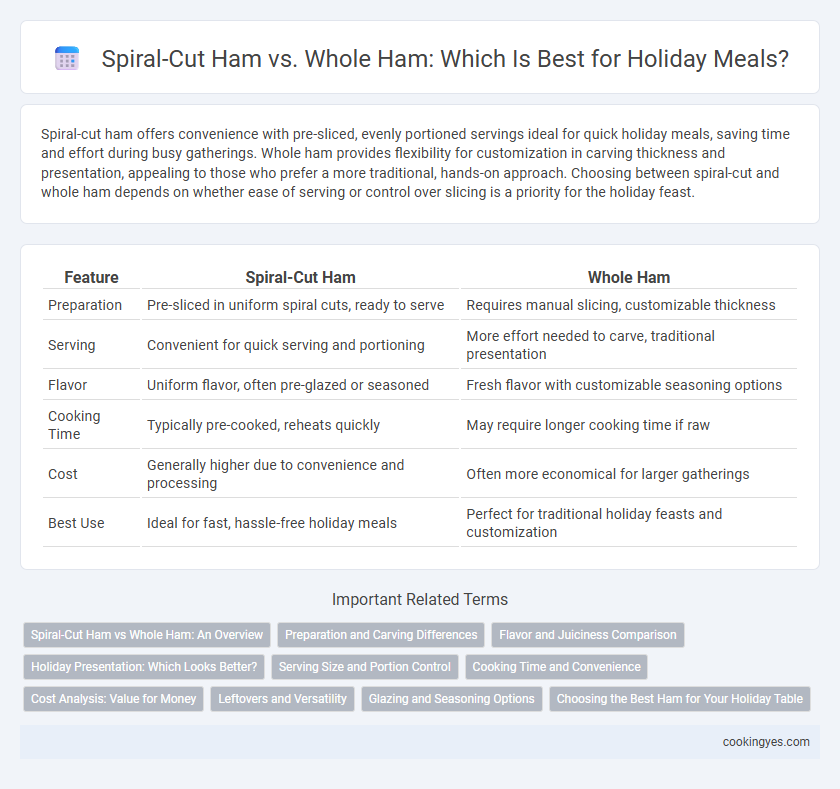Spiral-cut ham offers convenience with pre-sliced, evenly portioned servings ideal for quick holiday meals, saving time and effort during busy gatherings. Whole ham provides flexibility for customization in carving thickness and presentation, appealing to those who prefer a more traditional, hands-on approach. Choosing between spiral-cut and whole ham depends on whether ease of serving or control over slicing is a priority for the holiday feast.
Table of Comparison
| Feature | Spiral-Cut Ham | Whole Ham |
|---|---|---|
| Preparation | Pre-sliced in uniform spiral cuts, ready to serve | Requires manual slicing, customizable thickness |
| Serving | Convenient for quick serving and portioning | More effort needed to carve, traditional presentation |
| Flavor | Uniform flavor, often pre-glazed or seasoned | Fresh flavor with customizable seasoning options |
| Cooking Time | Typically pre-cooked, reheats quickly | May require longer cooking time if raw |
| Cost | Generally higher due to convenience and processing | Often more economical for larger gatherings |
| Best Use | Ideal for fast, hassle-free holiday meals | Perfect for traditional holiday feasts and customization |
Spiral-Cut Ham vs Whole Ham: An Overview
Spiral-cut ham offers convenience with pre-sliced, evenly portioned pieces that simplify serving during holiday meals, reducing preparation time and waste. Whole ham provides versatility in cooking methods and flavor customization but requires slicing expertise and more effort to serve. Choosing between spiral-cut and whole ham depends on the balance between ease of service and personalized culinary control for festive gatherings.
Preparation and Carving Differences
Spiral-cut ham offers convenience with pre-sliced, consistent pieces that simplify serving and reduce preparation time during holiday meals. Whole ham requires more effort in carving, often needing a sharp knife and careful slicing to achieve even portions, which may demand more skill and time. The choice affects meal pacing and presentation, making spiral-cut ideal for quick service and whole ham suited for those preferring traditional carving rituals.
Flavor and Juiciness Comparison
Spiral-cut ham offers consistent flavor and enhanced juiciness due to its thin, evenly sliced layers that allow marinades and glazes to penetrate deeply during cooking. Whole ham retains more natural moisture and richness, delivering a robust and traditional pork flavor, especially when slow-roasted. Choosing between spiral-cut and whole ham hinges on whether ease of serving or maximum juiciness with intense flavor is preferred for holiday meals.
Holiday Presentation: Which Looks Better?
Spiral-cut ham offers an elegant display with evenly sliced, fan-like layers that make serving effortless and visually appealing for holiday meals. Whole ham presents a traditional, rustic look with a uniform outer crust that can be customized with glazes and decorations for festive appeal. Choosing between the two depends on whether the priority is convenience and immediate visual appeal or a classic centerpiece that invites carving at the table.
Serving Size and Portion Control
Spiral-cut ham offers pre-sliced portions that simplify serving size management and reduce food waste during holiday meals. Whole hams require manual slicing, giving more control over portion thickness but demanding more effort and skill to ensure even servings. For gatherings, spiral-cut hams provide consistent, convenient portion control, while whole hams allow flexibility for guests with varying appetites.
Cooking Time and Convenience
Spiral-cut ham offers significant convenience with pre-sliced, ready-to-serve portions that greatly reduce preparation time compared to a whole ham. Whole hams require longer cooking times and additional effort for slicing, making them less practical for busy holiday meals. Choosing spiral-cut ham streamlines serving while ensuring consistent cooking and saving time in the kitchen.
Cost Analysis: Value for Money
Spiral-cut ham typically costs more per pound than whole ham but offers greater convenience and consistent portion sizes, reducing waste during holiday meals. Whole ham is more budget-friendly upfront and allows customization in slicing thickness, enhancing value for guests with diverse preferences. Evaluating cost per serving against preparation time reveals spiral-cut ham maximizes value for busy households prioritizing ease and efficiency.
Leftovers and Versatility
Spiral-cut ham offers convenient pre-sliced portions that simplify serving and increase ease of storing leftovers, making it ideal for quick meals and sandwiches. Whole ham provides versatility in preparation, allowing control over thickness of slices and repurposing trimmings for soups or casseroles. Leftover spiral-cut ham retains moisture well due to uniform slicing, while whole ham leftovers can be customized for various textures and recipes.
Glazing and Seasoning Options
Spiral-cut ham offers increased surface area, allowing glazes and seasonings to penetrate deeply, enhancing flavor absorption during baking. Whole ham provides a traditional option for applying robust, uniform dry rubs and basting, resulting in a more caramelized, crispy exterior. Both options benefit from glazes like honey mustard, brown sugar, or bourbon, while seasoning blends with cloves, cinnamon, and garlic complement the rich ham texture.
Choosing the Best Ham for Your Holiday Table
Spiral-cut ham offers convenience with pre-sliced, uniform pieces that save time during holiday meals, making it ideal for large gatherings. Whole ham provides versatility in slicing thickness and presentation, allowing for customized servings to suit varied preferences. Considering factors like ease of serving, texture, and flavor ensures selecting the best ham for your holiday table experience.
Spiral-cut ham vs whole ham for holiday meals Infographic

 cookingyes.com
cookingyes.com